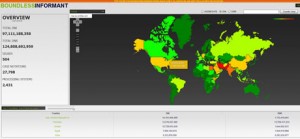Here’s what the White House has offered as talking points to defend collecting (DiFi has confirmed) all the call data from all Americans since 2006. Interspersed is my commentary.
The article discusses what purports to be an order issued by the Foreign Intelligence Surveillance Court under a provision of the Foreign Intelligence Surveillance Act that authorizes the production of business records. Orders of the FISA Court are classified.
As they’ve done with drone strikes and, especially, WikiLeaks cables before, the Administration refuses to confirm that this is, in fact, what several members of Congress have made it clear it is: an authentic FISA Order that (as Dianne Feinstein revealed) is just the quarterly renewal of a program that goes back to the PATRIOT Act renewal in March 2006.
In other words, with its “talking points,” the Administration is recommitting to keeping this program legally secret, even though it’s not secret.
Everything that say after they set up that information asymmetry should be regarded with the knowledge that the White House refuses to permit you to check its claims.
The talking points go on.
On its face, the order reprinted in the article does not allow the Government to listen in on anyone’s telephone calls. The information acquired does not include the content of any communications or the name of any subscriber. It relates exclusively to metadata, such as a telephone number or the length of a call.
Here, the White House does two things. With its “exclusively metadata” comment, it tries to minimize how much metadata really provides. Here’s how Shane Harris, in a superb explainer, describes what metadata can really provide.
What can you learn with metadata but no content?
A lot. In fact, telephone metadata can be more useful than the words spoken on the phone call. Starting with just one target’s phone number, analysts construct a social network. They can see who the target talks to most often. They can discern if he’s trying to obscure who he knows in the way he makes a call; the target calls one number, say, hangs up, and then within second someone calls the target from a different number. With metadata, you can also determine someone’s location, both through physical landlines or, more often, by collecting cell phone tower data to locate and track him. Metadata is also useful for trying to track suspects that use multiple phones or disposable phones. For more on how instructive metadata can be, read this.
Note the White House fails to mention the forms of some metadata, such as geolocation, that are particularly invasive.
But the other thing this White House bullshit talking point does is precisely the same thing the Bush White House did when, in 2005 after James Risen and Eric Lichtblau exposed the illegal wiretap program, it dubbed a subpart of the program the Terrorist Surveillance Program and talked about how innocuous it was taken in solitary. The White House is segregating one part of the government’s interdependent surveillance system and preening about how harmless that isolated part is in isolation.
What the White House doesn’t mention is how the government uses this data, among other ways, to identify possible terrorists who they can conduct more investigation of, including accessing their content using this data mining to establish probable cause.
What the White House is trying to hide, in other words, is that this collection is part of a massive collection program that uses algorithms and other data analysis to invent people to investigate as terrorists.
And then the bullshit White House talking points contradict themselves.
Information of the sort described in the Guardian article has been a critical tool in protecting the nation from terrorist threats to the United States, as it allows counterterrorism personnel to discover whether known or suspected terrorists have been in contact with other persons who may be engaged in terrorist activities, particularly people located inside the United States.
Wait, what? Just one talking point ago, the White House told us that, “The information acquired does not include the content of any communications or the name of any subscriber.” But here we are, a mere talking point later, and the White House is claiming that it is used to discover whether known terrorists are in contact with other persons? Uh, so it does involve the known identities of both existing suspects and those gleaned from this massive collection of data, huh?
But don’t worry. Because a court has rubber stamped this.
As we have publicly stated before, all three branches of government are involved in reviewing and authorizing intelligence collection under the Foreign Intelligence Surveillance Act. Congress passed that act and is regularly and fully briefed on how it is used, and the Foreign Intelligence Surveillance Court authorizes such collection.
How does the separation of powers work again? Congress passes the law, the Executive enforces the law, and Courts review the law?
Only, in its bold claim that all three branches of government support this, the Court’s role is to “authorize such collection.” There’s a reason for that word, authorize. The only thing the courts are permitted to review are whether the government has provided,
(A) a statement of facts showing that there are reasonable grounds to believe that the tangible things sought are relevant to an authorized investigation (other than a threat assessment) conducted in accordance with subsection (a)(2) to obtain foreign intelligence information not concerning a United States person or to protect against international terrorism or clandestine intelligence activities, such things being presumptively relevant to an authorized investigation if the applicant shows in the statement of the facts that they pertain to—
(i) a foreign power or an agent of a foreign power;
(ii) the activities of a suspected agent of a foreign power who is the subject of such authorized investigation; or
(iii) an individual in contact with, or known to, a suspected agent of a foreign power who is the subject of such authorized investigation; and
(B) an enumeration of the minimization procedures adopted by the Attorney General under subsection (g) that are applicable to the retention and dissemination by the Federal Bureau of Investigation of any tangible things to be made available to the Federal Bureau of Investigation based on the order requested in such application.
That is, the government just has to make a “reasonable” argument that this stuff is “relevant” to an investigation geared toward protecting against international terror or foreign clandestine activities. And if they can point to any number of foreign types (a foreign power, a suspected agent of a foreign power, or someone in contact with a suspected agent of a foreign power), the judge is instructed to presume it is related even if that seems like a stretch.
This is not a robust review of the claims the government is making. On the contrary, it is designed not to be a robust review of those claims.
Which brings us to Congress, that other branch the White House touts. It is utterly and embarrassingly true that they have repeatedly bought off on this, even if James Sensenbrenner, among others, is suckering journalists claiming that he didn’t. Indeed, oversight committees shot down efforts to limit Section 215 orders to people who actually had a tie to a suspected terrorist or foreign spy in 2006, 2009, and 2011. Such language was shot down each time. So, too, were efforts in 2011 and 2012 to reveal what was really going on in Section 215 collection; oversight committees shot that down too.
So here, in a rarity for national security overreach, the White House is absolutely right. Congress repeatedly bought off on this program, including its unbelievably broad standard for “relevance.”
Except … except … when Ron Wyden tried to get the government to tell him how many Americans’ records had been reviewed (by using this front-end collection to identify the back-end collection) the Inspectors General in question professed to be helpless to do that (later hints suggested they had done that study, but refused to share it with the Intelligence Committees).
So while it is true that Congress, with a few exceptions, have been completely complicit in this, it is also true that the Executive Branch has withheld the information Congress needs to understand what is happening with US person data.
I wonder why?
Never you worry, though, because it’s all constitutional.
There is a robust legal regime in place governing all activities conducted pursuant to the Foreign Intelligence Surveillance Act. That regime has been briefed to and approved by the Court.
Activities authorized under the Act are subject to strict controls and procedures under oversight of the Department of Justice, the Office of the Director of National Intelligence and the FISA Court, to ensure that they comply with the Constitution and laws of the United States and appropriately protect privacy and civil liberties.
Don’t worry, the White House concludes. The legal review designed not to be robust is robust.
And to be fair, the FISA Court has, on at least one occasion, told the Administration they were violating the Fourth Amendment. Though apparently DOJ and ODNI thought this Fourth Amendment violative collection was kosher, as they had to be slapped down by the court, so I’m not sure what purpose their purported oversight serves.
But as I pointed out this morning, there’s a flaw to this argument that is grounded in the Administration’s refusal to admit this is a real FISA Court order.
Standing.
The government, over and over and over and over, assures us this is all very Constitutional. Even while the government, over and over and over and over, goes to great lengths to ensure citizens don’t learn how they’re being surveilled, which would (in addition to pissing them off) give them the ability to sue.
Until the Americans who have been surveilled are permitted to challenge this in a court — precisely what the government has gone to great lengths to prevent — White House claims to constitutionality ring hollow.
The government doesn’t have the confidence to let us test these claims in court. That ought to tell you what they really think about its constitutionality.


